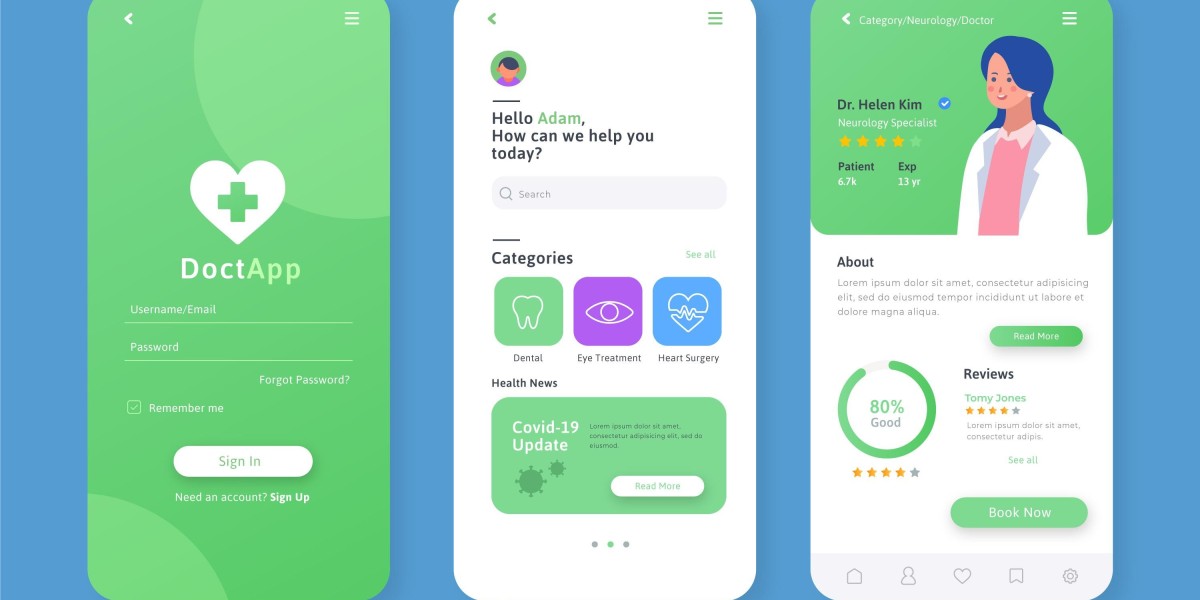The healthcare industry is undergoing a digital revolution, and at the heart of this transformation are healthcare mobile app developers. These tech-savvy professionals play a crucial role in creating applications that enhance patient care, streamline processes, and revolutionize the way healthcare is delivered. In this comprehensive exploration, we delve into the intricate roles and responsibilities of healthcare mobile app developers, understanding their impact on patient outcomes, provider efficiency, and the overall healthcare ecosystem.
I. Understanding the Landscape: The Evolution of Healthcare Mobile Apps
Healthcare mobile apps have become integral to the industry, addressing a myriad of challenges and providing solutions that cater to patients, healthcare providers, and administrative staff. From appointment scheduling to remote patient monitoring, healthcare mobile apps are designed to improve accessibility, efficiency, and overall healthcare delivery.
II. The Crucial Roles of Healthcare Mobile App Developers:
1. Application Architect:
Healthcare mobile app developers act as architects, designing the blueprint of the application. They need to understand the unique requirements of healthcare, ensuring the app's architecture is scalable, secure, and compliant with healthcare regulations such as HIPAA.
2. User Experience (UX) Designer:
Crafting an intuitive and user-friendly interface is paramount in healthcare apps. Developers focus on creating a seamless user experience, considering the needs of both patients and healthcare professionals. The goal is to ensure that the app is easily navigable, reducing the learning curve for users.
3. Integration Specialist:
Healthcare mobile apps often need to integrate with existing electronic health record (EHR) systems, laboratory databases, and other healthcare platforms. Developers are responsible for seamless integration, ensuring that data flows securely between different components of the healthcare ecosystem.
4. Security Expert:
Security is a top priority in healthcare apps due to the sensitive nature of patient data. Developers implement robust security measures, including encryption, secure authentication, and compliance with healthcare data protection standards like HIPAA, to safeguard patient information.
5. Data Analytics Developer:
Healthcare apps generate vast amounts of data. Developers with expertise in data analytics create functionalities that allow healthcare providers to derive meaningful insights from patient data. This includes implementing algorithms for predictive analytics, identifying trends, and improving clinical decision-making.
6. Telehealth Innovator:
With the rise of telehealth, developers are instrumental in creating features that facilitate virtual consultations, remote monitoring, and telemedicine services. This role involves integrating video conferencing, real-time communication, and remote patient monitoring capabilities into the app.
7. Regulatory Compliance Specialist:
Healthcare is a highly regulated industry, and developers need to stay abreast of the ever-changing regulatory landscape. Ensuring that the app complies with healthcare regulations, privacy laws, and industry standards is a crucial responsibility.
8. Continuous Learner:
The healthcare industry is dynamic, with new technologies and methodologies emerging regularly. Developers must be avid learners, staying informed about the latest advancements in healthcare technology, such as wearables, IoT devices, and emerging healthcare standards.
III. Responsibilities in the App Development Lifecycle:
1. Requirements Analysis:
Developers collaborate with healthcare stakeholders, including clinicians, administrators, and patients, to gather and analyze requirements. Understanding the unique needs of healthcare professionals and patients is vital in creating a solution that addresses real-world challenges.
2. Prototyping and Design:
Before full-scale development, developers create prototypes and design mock-ups to visualize the app's interface and functionality. This iterative process involves feedback from end-users, ensuring that the final product aligns with user expectations.
3. Development and Coding:
The core responsibility of healthcare mobile app developers is coding the application. They leverage programming languages like Swift (for iOS) or Kotlin/Java (for Android) to build the app's functionality. The coding phase includes implementing features for data entry, appointment scheduling, medication tracking, and more.
4. Testing and Quality Assurance:
Rigorous testing is essential in healthcare app development. Developers conduct unit testing, integration testing, and user acceptance testing to identify and rectify bugs, ensuring the app functions seamlessly. Quality assurance is paramount, particularly in healthcare, where errors can have serious consequences.
5. Deployment and Release:
Once the app passes testing, developers oversee its deployment to app stores or internal distribution channels. They manage the release process, ensuring a smooth transition from development to production. This includes addressing any issues that may arise during the initial rollout.
6. Post-Launch Maintenance and Updates:
The role of a healthcare mobile app developer extends beyond the app's launch. Continuous maintenance involves monitoring the app's performance, addressing user feedback, and releasing updates to enhance features, security, and overall functionality.
IV. Technologies Shaping Healthcare Mobile App Development:
1. Mobile Platforms:
Developers choose platforms such as iOS and Android based on the target audience and device preferences. They leverage platform-specific languages and tools to create native applications that offer optimal performance.
2. Cross-Platform Development:
With the demand for apps on multiple platforms, developers often explore cross-platform frameworks like React Native or Flutter. This allows them to write code once and deploy it on both iOS and Android platforms, streamlining the development process.
3. Application Programming Interfaces (APIs):
APIs enable communication between different software components. Developers use healthcare APIs to integrate their apps with EHR systems, lab databases, and other healthcare infrastructure, ensuring interoperability.
4. Cloud Computing:
Cloud technologies play a pivotal role in healthcare app development, providing scalable storage, data processing, and accessibility. Developers leverage cloud platforms like AWS, Azure, or Google Cloud to enhance the app's capabilities and store data securely.
5. Blockchain:
Blockchain technology is gaining traction in healthcare for its ability to secure and trace transactions. Developers may incorporate blockchain for secure patient data management, ensuring transparency, and preventing unauthorized access.
V. The Impact on Patient-Centric Care:
The roles and responsibilities of healthcare mobile app developers directly impact patient-centric care delivery. The integration of healthcare apps into the patient journey enhances accessibility, promotes preventive care, and facilitates better communication between patients and healthcare providers.
1. Empowering Patients:
Healthcare apps empower patients by providing access to their health information, appointment scheduling, medication reminders, and telehealth services. This fosters a sense of ownership over one's health and encourages proactive engagement in healthcare decisions.
2. Remote Monitoring and Management:
Developers play a key role in creating apps that enable remote patient monitoring. From tracking vital signs to managing chronic conditions, these apps allow healthcare providers to monitor patients outside traditional clinical settings, leading to proactive intervention and personalized care plans.
3. Enhancing Communication:
Healthcare apps facilitate seamless communication between patients and healthcare professionals. Features like secure messaging, appointment reminders, and virtual consultations improve accessibility, ensuring that patients can connect with their healthcare providers when needed.
4. Medication Adherence:
Developers implement features that promote medication adherence through timely reminders, dosage tracking, and educational resources. This fosters a culture of adherence, preventing medication errors and improving overall health outcomes.
VI. Challenges in Healthcare Mobile App Development:
Despite the positive impact of healthcare apps, developers face several challenges unique to the healthcare landscape:
1. Data Security and Privacy:
Healthcare apps deal with sensitive patient data, necessitating robust security measures. Developers must ensure compliance with healthcare regulations and implement encryption protocols to safeguard patient information.
2. Interoperability:
Integrating healthcare apps with existing systems poses challenges due to the diversity of EHR systems and healthcare databases. Developers must navigate interoperability issues to ensure seamless data exchange.
3. Regulatory Compliance:
Staying compliant with healthcare regulations, such as HIPAA in the United States or GDPR in Europe, is a constant challenge. Developers need to navigate complex regulatory frameworks to ensure their apps meet legal requirements.
4. User Adoption and Engagement:
The success of healthcare apps relies on user adoption and ongoing engagement. Developers must create apps that are not only functional but also user-friendly and capable of sustaining long-term user engagement.
VII. The Future Landscape: Emerging Trends in Healthcare App Development:
As technology continues to advance, healthcare mobile app developers are poised to leverage emerging trends that will shape the future of healthcare:
1. Artificial Intelligence (AI) and Machine Learning (ML):
AI and ML will play a significant role in healthcare apps, offering predictive analytics, personalized treatment recommendations, and intelligent automation for administrative tasks.
2. Wearable Technology Integration:
Integrating healthcare apps with wearable devices will become more prevalent. This includes apps that sync with smartwatches, fitness trackers, and other wearables to provide real-time health data.
3. Voice-Activated Interfaces:
Voice-activated interfaces, powered by technologies like natural language processing, will enhance accessibility for users. Healthcare apps may incorporate voice commands for tasks such as appointment scheduling or medication reminders.
4. Virtual Reality (VR) and Augmented Reality (AR):
VR and AR will find applications in healthcare for medical training, patient education, and even virtual therapy. Developers may explore immersive experiences to enhance various aspects of healthcare delivery.
VIII. MobileAppdaily: Your Guide to Healthcare App Development Insights:
Navigating the ever-evolving landscape of healthcare mobile app development requires staying informed about the latest trends, technologies, and best practices. MobileAppdaily serves as a comprehensive resource for healthcare app developers, offering insights, reviews, and industry spotlights.
Why MobileAppdaily?
Insightful Content: MobileAppdaily provides in-depth articles and guides on healthcare app development trends, technologies, and challenges. Stay informed about the latest advancements shaping the healthcare tech landscape.
Reviews and Rankings: Explore reviews and rankings of healthcare apps, development tools, and technologies. MobileAppdaily offers a curated view of the healthcare app ecosystem, helping developers make informed decisions.
Developer Resources: For healthcare app developers, MobileAppdaily offers resources, tutorials, and best practices. Dive into their developer-centric content to enhance your skills and stay updated on the latest tools and frameworks.
Industry Spotlights: MobileAppdaily shines a spotlight on top healthcare app developers and industry leaders. Explore in-depth profiles, case studies, and success stories of experts shaping the future of healthcare mobile app development.
IX. Conclusion: Shaping the Future of Healthcare Delivery
Healthcare mobile app developers play a pivotal role in shaping the future of healthcare delivery. Their multifaceted roles and responsibilities encompass not only technical expertise but also a deep understanding of the unique challenges and opportunities within the healthcare industry. As technology continues to advance, healthcare app developers are at the forefront of innovation, creating solutions that empower patients, streamline processes, and contribute to the overall improvement of healthcare outcomes. The future holds exciting possibilities, and healthcare mobile app developers are the architects driving this transformative journey.



